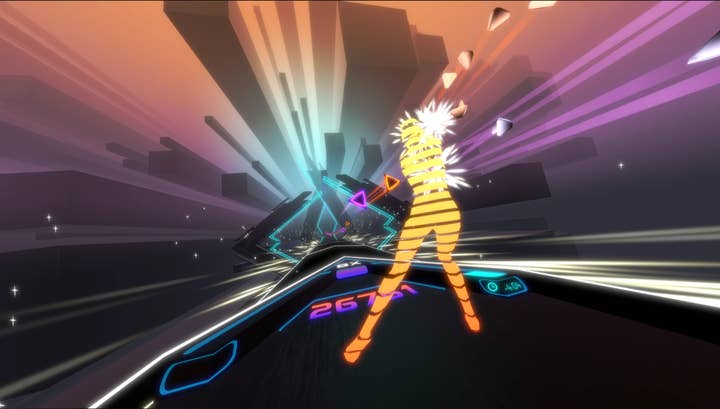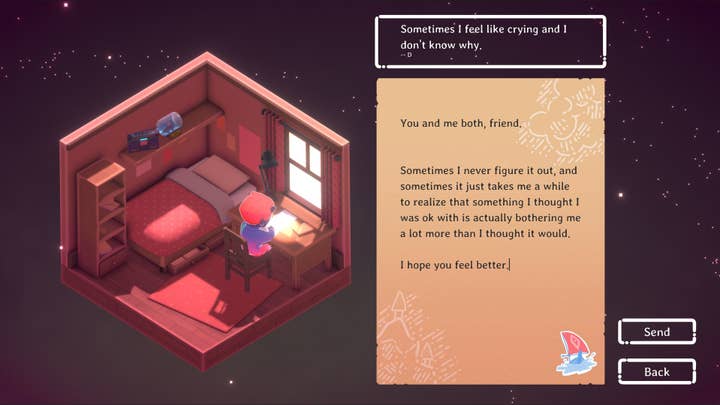A guide to designing transformative, empowering experiences
Robin Arnott and Heather Ray look into the many ways to create impactful games that evoke a wide range of emotional responses
As game developers, we don't often think of ourselves as having god-like power. But consider this: we build alternate universes, we shape the experience of players, sometimes resulting in a profound impact on those people in ways we might not recognize.
When we play a game, we practice a mode of being, and that practice can profoundly impact who we are in the world.
You can help provoke truly transformative experiences that leave the player changed for the good
Game designers have gotten really good at helping us practice a few things:
- Sharpening our responses to stressful stimuli.
- Bringing complex situations under control.
- Sharpening our attention into focus and flow.
Each of the above, however, is the "yang" expression of a full polarity! Games can just as effectively help players relax into the "yin" expression of that same polarity. Consider, in antithesis to the above, how a videogame might encourage players to practice the following, without sacrificing fun and entertainment value:
- Calm-centeredness in the face of novel stimulus.
- Enjoying increased complexity, even to a point beyond comprehension or mastery.
- Relaxing our attention into release and bliss.
Here are five ways that you can break out of the "yang" game-design box, and use your talents to produce more deeply satisfying experiences that evoke a wider range of emotional responses and engagement patterns. By synthesizing "yin" and "yang" together, you can help provoke truly transformative experiences that leave the player changed for the good.

Be intentional about the targeted state of mind
In designing transformative games, we are directing a player's attention to a thought, feeling, or experience that is in some way novel for them. Some realization can be achieved, some new state of being can be accessed, and players can leave these experiences with a more full appreciation of how they can show up in life.
A great place to start is your own experience: what meaningful emotional experiences have you had, and what mechanics could you design that would evoke those feelings in a player?
Example: The designers of Audio Trip were inspired by the ecstatic states of unity they experienced at raves. They wanted to create a game that could provoke that kind of embodied bliss. The player is transported to some kind of interdimensional arena where they're challenged to move their whole bodies to the choreography.
The three difficulty levels challenge players to develop greater and greater proprioception (that's how you know where your body is in space). Ecstatic states of embodied flow are generated through this seriously fun and well crafted experience.

Make the player the center of the experience
Games can really alter your sense of identity. When you pick up that controller or put on that headset, you start to identify with the avatar you're controlling. You say, "I shot that enemy hiding in the tower," and not "I made my character shoot the enemy." In the alternate universe you create, you're also creating an identity for your player to embody.
Games become more personal, though, when the player is invited to participate in the game directly, instead of through an avatar. When you remove the separation between the player and the game, in-game experiences have the potential to profoundly impact the way the player sees themselves in their world. You can think of this as giving the player experience points they can take back to their default world, instead of leaving them behind in the game.
Example: Each challenge met by the player in the VR game Guided Tai Chi adds a real life skill to their repertoire, and improves their body awareness. Players get to practice real Tai Chi skills where accuracy matters.
With over 100 variations of flow, and the ability to compete world-wide, players are served with plenty of challenges to improve their Tai Chi skill. Plus, Tai Chi is meditative, so they get the added benefit of that along with the physical practice.

Think of your game as a check-in for your players
Traditionally, video games are considered as a way to check out of the real world, to de-stress and forget about the daily grind. The problem is that all of life's challenges are right there where you left them when the game ends. There's a rich opportunity, however, for your game to help the player "check in" with themselves instead. Building tools for self-development creates replayability that doesn't rely on addiction and negative feedback.
Example: In Kind Words (lo-fi chill beats to write to), players are invited to reflect on their emotional state, and to share in vulnerability what they're experiencing with other players. They'll also have the opportunity to respond to players looking for support and kind words.
This may seem like a simple social experience but to many, being vulnerable with strangers is a totally new mind-state. Practicing on other anonymous, supportive players generates positive feedback that opens players to be more vulnerable in everyday situations.

Employ novel interfaces to connect more deeply to the player
Advancing technology gives us new and exciting opportunities to enhance player immersion. For the entire history of video games, we've relied on hand-held controls, utilizing thumbs and fingers to move an avatar through an experience. Today's tech landscape offers new horizons of opportunity. We have bio-sensors that track eye movement, pulse rate, and even brain waves!
Virtual reality frees the hands and allows the player to get their whole body involved. Experiment with different interfaces with the intention of connecting the player more viscerally into the game.
Example: SoundSelf: A Technodelic uses the player's breath and voice to guide them into yogic-style breathing, and viscerally provoke altered states of consciousness. Typically the only time you'd use your voice in a game is to communicate with other players. Here, players are guided to fill their lungs completely and exhale in long audible tones.
The repeated practice of this meditation can have a profound effect on the player's state of mind. Maintaining focus on breathing, and creating a vibratory feedback inside the body, players are invited into a deeper state of presence and connection to their senses.

Let the player go
Consider what it feels like to become addicted to a game interaction. We all know that certain games are trying hard (and succeeding with tremendous profit) to hack your brain's dopamine response. Many of us in the game industry have become the world's experts at stimulating tension and release cycles in just such a way to provoke a dependency.
Designing engagement patterns that leave a player addicted and craving more is relatively easy. But designing gameplay patterns that leave a player feeling "full" requires both restraint, and a guiding hand all the way into a graceful "goodbye."
Games like this are ultimately more satisfying, as they leave the player feeling complete.
Example: Journey made use of Joseph Campbell's hero's journey to engage the player in a complete emotional arc. There are tense moments, like when you are avoiding detection of a giant flying monster -- but the ending is free from tension, and doesn't leave the player wondering if there's anything they missed.
Relatively few players became addicted to that game. But the emotional arc was so satisfying that it swept the awards in 2012 and became Sony's best-selling PSN game.
Learn more
Here are some resources to dive more deeply into the ideas of transformative gaming:
- Robin Arnott's GDC talk, 'Designing a Trance: Game Design and Meditation'
- 25-page step-by-step workbook on trance design for games
- The Technodelic Manifesto
Robin Arnott, CEO of Andromeda Entertainment, is a game designer and longstanding public speaker in the industry of consciousness technology. He wrote The Technodelic Manifesto to help articulate the emerging trend of games being used to shift states of mind. Heather Ray is co-founder of Andromeda Entertainment and a transformative experience designer and interdimensional reality engineer.